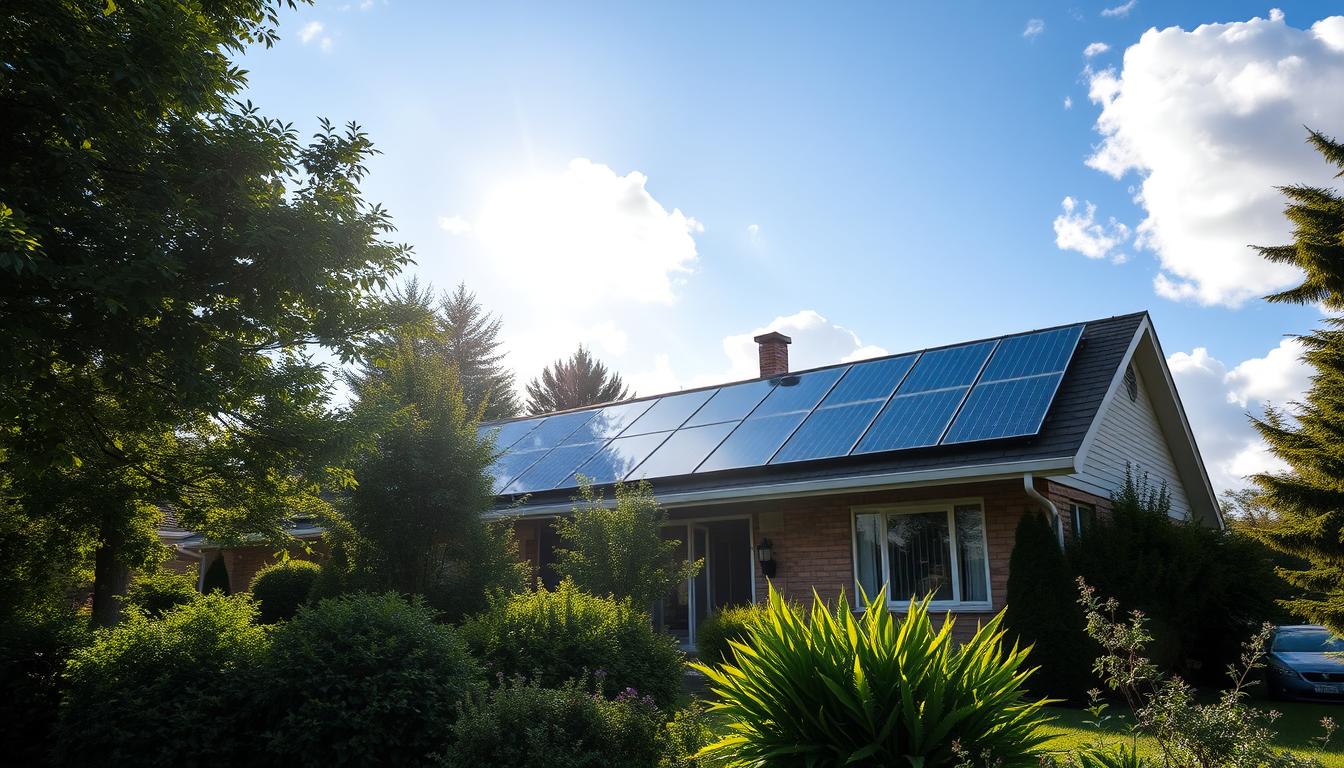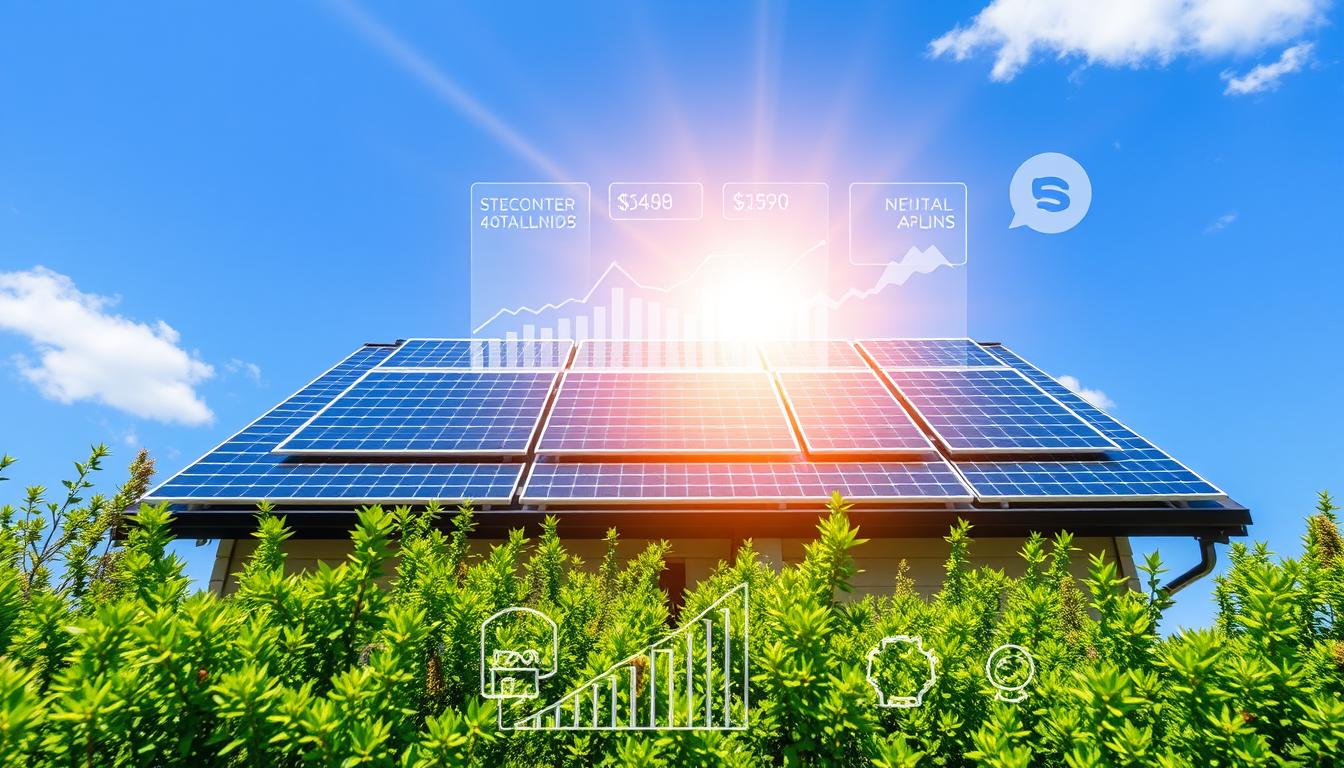Solar Power for Home Heating & Energy: Complete Guide
John looked out his living room window and saw the sun’s rays. He thought about using this renewable energy to heat his home and power his life. He was about to start his journey to sustainable living.
This guide will explore solar energy for homes in India. We’ll cover types of solar systems, installation, and financial benefits. It’s designed to help homeowners use the sun’s power and live sustainably.
Key Takeaways
- Discover the two main types of solar energy systems: photovoltaic and solar thermal.
- Learn about the key components of a solar power system and the role of energy storage solutions.
- Understand the effectiveness of solar power in heating and powering homes in India.
- Explore the solar installation process, including site assessment, permits, and the choice between professional and DIY installation.
- Analyze the cost-effectiveness of solar power and the financial benefits it offers homeowners.
Understanding Solar Energy Systems for Home Use
Homeowners in India can choose from two main solar energy systems: photovoltaic (PV) and solar thermal. Both use the sun’s energy but for different needs. They have their own parts.
Photovoltaic vs Solar Thermal Systems
Photovoltaic systems turn sunlight into electricity. This power runs your home and gadgets. Solar thermal systems, however, heat water using the sun’s heat. They are better for hot water needs.
Key Components of Solar Power Systems
- Solar panels: These catch sunlight and turn it into electrical energy.
- Inverter: Changes the DC power from solar panels to AC power for home use.
- Batteries: Keep extra energy for use at night or when sunlight is low.
- Mounting system: Holds solar panels in the best spot for more energy.
Energy Storage and Battery Solutions
Keeping extra solar energy is key for steady power, especially when sunlight is low. Lithium-ion batteries are a top pick for homes. They pack a lot of energy and last long. Other choices include lead-acid and flow batteries.
| Battery Type | Energy Density | Lifespan | Cost |
|---|---|---|---|
| Lithium-ion | High | Long | High |
| Lead-acid | Moderate | Shorter | Lower |
| Flow Batteries | High | Long | High |
Knowing about solar systems and their parts helps homeowners in India choose wisely. They can pick what fits their energy needs and budget.
How Well Does Solar Work to Power and Heat a Home?
India is moving towards renewable energy, and solar power is key. It can cut down energy costs and make homes more efficient. But, it depends on the weather, how well homes are insulated, and how much energy they use.
Let’s see how solar energy works in real homes in India. These stories show the benefits of using solar power.
Harnessing the Power of the Sun
In Kochi, the Sharma family put a 5-kilowatt solar system on their roof. It cut their electricity bills by over 80%, saving them money. Their home is now more energy-efficient and cozy thanks to the system and better insulation.
In Rajasthan, the Patels use a solar system to heat their water. It means no more electric or gas water heaters. This saves them energy and helps the planet.
| Location | Solar System | Energy Savings |
|---|---|---|
| Kochi | 5 kW Photovoltaic | Over 80% of electricity bills |
| Rajasthan | Solar Thermal Water Heater | Eliminated need for traditional water heaters |
These stories show solar energy’s benefits in Indian homes. They talk about lower energy costs, improved energy efficiency, and a greener living space.
“Solar power has transformed our home, making it more comfortable and financially sustainable. The initial investment has paid off through significant long-term savings on our energy bills.”
– Sheila Sharma, Kochi homeowner
Solar Installation Process and Requirements
Switching to solar power for your home is exciting but needs careful planning. The solar installation process in India has several stages. These include assessing your property and getting the right permits.
Site Assessment and Planning
A detailed site assessment is the first step. Solar experts check your roof’s orientation, shade, and space. They plan your system’s size and placement to ensure it works well.
Permits and Regulations in India
Getting the right permits is key in India. Homeowners need to work with their utility and local authorities. They must get building, electrical permits, and interconnection agreements. Following these rules is vital for a good solar installation.
Professional vs DIY Installation
- Professional installation is usually the best choice. Licensed solar technicians ensure your system is set up right. They make sure it works well with your home’s electrical system.
- DIY installation is possible but requires a lot of effort and knowledge. Without the right skills, it can be risky and not work as well.
Choosing between professional and DIY installation depends on your skills, budget, and comfort. Talking to a trusted solar provider can help you decide what’s best for your home.
Cost Analysis and Financial Benefits
Homeowners in India are looking into solar power. It’s important to know the costs and benefits. Solar systems can save money in the long run, but the initial cost is a big worry.
The cost of a solar system for homes in India is between ₹3 to ₹4 lakhs. This depends on the system’s size, panel quality, and installation needs. But, government incentives and net metering can help cover these costs.
| Cost Factor | Average Cost (in ₹) |
|---|---|
| Solar Panels | 1,50,000 – 2,00,000 |
| Inverter | 50,000 – 80,000 |
| Mounting Structure | 20,000 – 30,000 |
| Wiring and Accessories | 30,000 – 50,000 |
| Installation and Labor | 50,000 – 80,000 |
Net metering lets homeowners sell extra solar power back to the grid. This can greatly reduce energy costs. The Government of India also offers tax rebates and subsidies to support solar power adoption.
A family in New Delhi installed a 5 kW solar system. They saw their solar costs paid off in 6-7 years thanks to net metering. The system kept saving money for the panels’ entire life, making it a wise investment.
Homeowners in India should weigh the costs, incentives, and long-term savings of solar energy. The savings and environmental benefits make solar power a great choice for sustainable energy.
Maximizing Solar Energy Efficiency
To get the most out of your solar power system, focus on efficiency. This means placing panels wisely, saving energy, and using smart home tech.
Panel Placement and Orientation
Where you put your solar panels matters a lot. They should face south and be tilted right to catch the most sunlight. Keeping them clean is also key to their performance.
Home Energy Conservation Tips
Adding to your solar system, small changes can make a big difference. Better insulation, energy-saving appliances, and LED lights cut down on energy use. This boosts your solar system’s value.
Smart Technology Integration
Smart home tech can make your solar energy use better. With smart thermostats, energy monitors, and automation, you can control and optimize your energy. This ensures you use all the solar power your system can make.
FAQ
How well does solar work to power and heat a home?
Solar power can be very effective for homes, but it depends on several things. These include the climate, how well the home is insulated, and how much energy it uses. In many parts of India, solar energy can cover a lot of a home’s needs. This brings both environmental and financial benefits to homeowners.
What are the different types of solar energy systems for homes?
There are two main types of solar systems for homes. Photovoltaic (PV) systems turn sunlight into electricity. Solar thermal systems use the sun’s heat to warm water or air. The best choice depends on what the homeowner needs and wants.
What are the key components of a solar power system?
The main parts of a solar power system are solar panels, an inverter, and batteries. You also need wiring and electrical equipment. The exact parts depend on the system type and what the homeowner needs.
How do I get my home ready for a solar installation?
Before installing solar, homeowners should check if their property is suitable. They need to get the right permits and decide if they want a pro to install it or do it themselves. Things like roof orientation and local rules are important to consider.
What are the financial benefits of going solar?
Installing solar can save a lot of money on energy bills over time. This is thanks to net metering and the falling cost of solar tech. India also offers government incentives and tax credits to help with the cost.
How can I maximize the efficiency of my solar energy system?
To get the most out of your solar system, focus on a few key things. Place panels right and use smart tech. Also, save energy and keep your system in good shape. Regular checks and monitoring are crucial for efficiency.
Akash verma s blog, where curiosity meets creativity! Sanjeet is a dedicated blogger with a passion for exploring diverse topics, from travel and technology to personal development and lifestyle. With a unique voice and engaging storytelling, he shares insights, experiences, and tips that inspire his readers to embrace life’s adventures.



